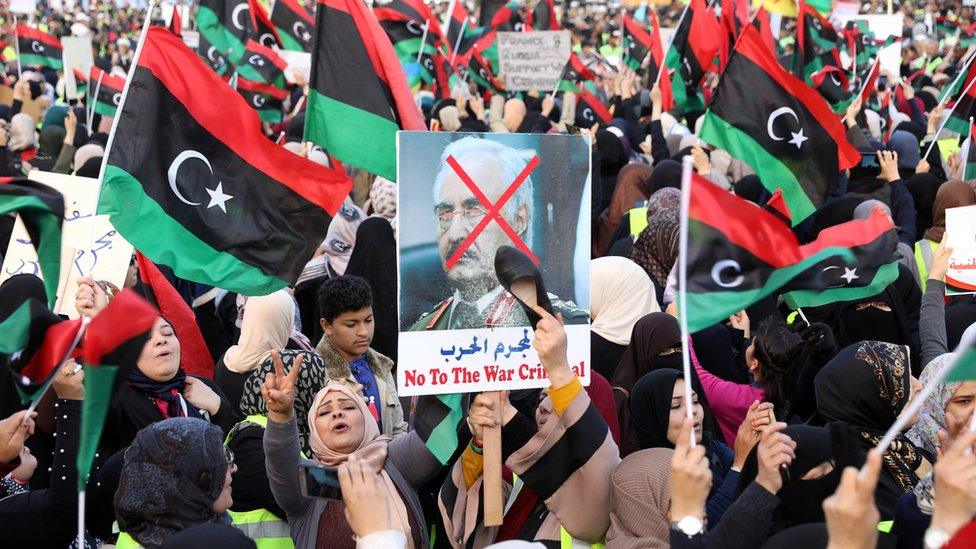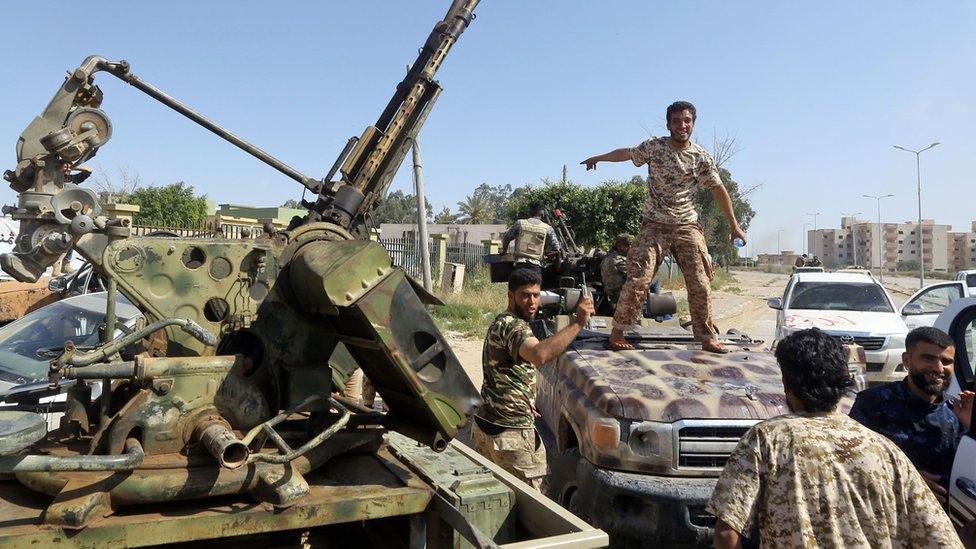Libya crisis: Trump speaks to insurgent General Haftar
- Published

On Friday Tripoli residents demonstrated against Gen Haftar's offensive
The White House says President Trump has spoken to Libyan eastern commander General Khalifa Haftar, whose forces are attacking the capital Tripoli.
During Monday's call, Mr Trump recognised Gen Haftar's efforts to combat terrorism and secure Libya's oil and they discussed Libya's future.
Tripoli is the seat of Libya's UN-backed and internationally recognised government.
Mr Trump's call suggests he endorses Gen Haftar, unlike some of his allies.
More than 200 people have been killed since the fighting began three weeks ago.
On Thursday the UN-backed Prime Minister Fayez al-Serraj condemned the "silence" of his international allies amid the assault by Gen Haftar's forces.
Libya has been torn by violence and political instability since long-time ruler Muammar Gaddafi was deposed and killed in 2011.
The latest crisis started three weeks ago, when Gen Haftar's eastern forces descended on the capital in what Mr Serraj has described as an attempted coup.
Gen Haftar's troops are advancing from various directions on the outskirts of the city and say they have seized Tripoli's international airport.
Does this mean Trump backs Haftar?
During Mr Trump's conversation with Gen Haftar, the pair "discussed a shared vision for Libya's transition to a stable, democratic political system", the White House says.
The BBC's Middle East Regional Editor Alan Johnston says the call seems to signal that Washington is swinging its weight behind Gen Haftar and may see him as being capable of restoring unity and order to the country.
But Gen Haftar's opponents say he would rule the country in a highly autocratic style, our correspondent adds.

Pro-government forces are fighting Gen Haftar's forces to the south of Tripoli
The US, along with Russia, has also refused to support a UK-drafted UN Security Council resolution calling for a ceasefire in Libya.
Russia objected to wording blaming Gen Haftar for the violence while the US did not give a reason, Reuters reported.
Gen Haftar has had backing from the UAE and Egypt and visited Saudi Arabia shortly before announcing his attack on Tripoli.
The UN-backed government in Tripoli has also accused France of supporting Gen Haftar. France has denied this.
Reuters quoted Jalel Harchaoui from the Clingendael Institute in The Hague as saying that Mr Trump's call was tantamount to supporting Gen Haftar's campaign and made a military intervention by an outside state such as Egypt more likely.
Who supports the Tripoli government?
Former colonial power Italy backs the internationally-recognised government.
UK Foreign Secretary Jeremy Hunt has also said there is "no justification" for Gen Haftar's move on Tripoli.
On Friday Mr Hunt spoke to US Secretary of State Mike Pompeo and the two agreed to "continue diplomatic efforts to achieve a freeze on the ground and a return to the political process", according to the state department.
Who is General Haftar?
A former army officer, he helped Colonel Gaddafi seize power in 1969 before falling out with him and going into exile in the US.
He returned in 2011 after the uprising against Gaddafi began and became a rebel commander.
After Gaddafi's fall he was appointed chief of the Libyan National Army (LNA) under an earlier UN-backed administration